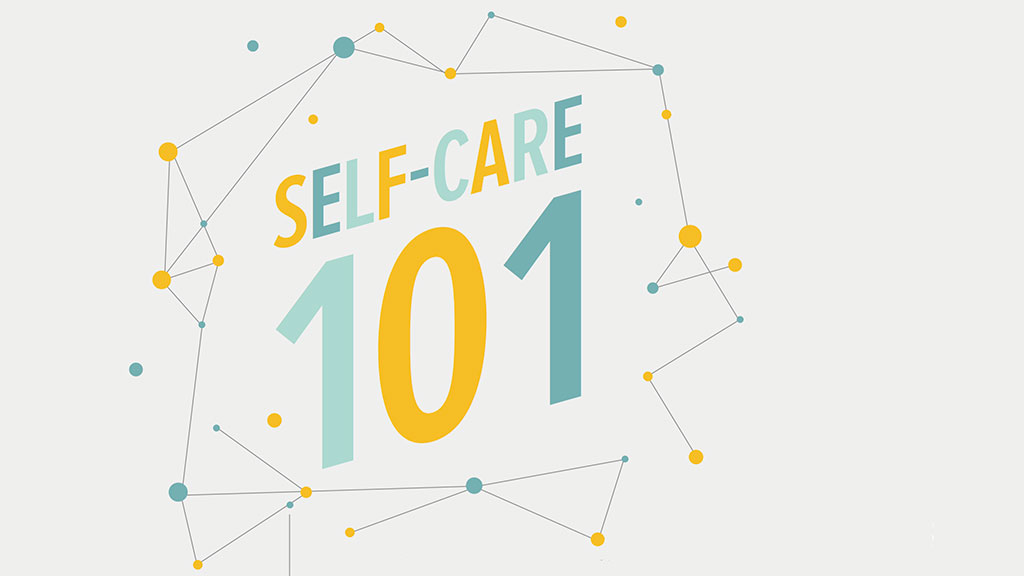Self-care 101: staying healthy and happy during school
 Jessica Hong
Jessica HongDaniella Marchand, a volunteer with The Landing at the U of A, had the same mindset as many other U of A students. She recognized how important it was for other students to take care of themselves, but rarely applied that same logic to her own life. “For the longest time, it was okay for other people to engage in self-care, but it wasn’t for me because I had too many things to do. I didn’t have time to take care for myself,” Marchand reflects.
That kind of thinking is common among a lot of students at the U of A, and surely further across the country, says Marchand, who co-facilitated the Landing’s peer mentorship group session about self-care on Jan. 21 as part of their Rainbow Peers series.
“There’s still a big misconception that when you are doing self-care, you’re taking advantage of time or you’re indulging yourself and you just don’t have that time to waste or those resources to waste. (But) I don’t think it’s a waste if you are taking care of yourself by doing it,” she says.
Self-care
The phrase “self-care” refers to any intentional actions people take to maintain their own physical, mental or emotional well-being.
It’s a simple, yet important, idea. But, the idea of self-care at the U of A is its own unique idea as being a student here brings with it its own identity, says Joshua Dunn, a Registered Psychologist with U of A Counselling and Clinical Services.
“Part of (self-care) may refer to a person’s identity as being a student on campus versus someone who just attends classes,” Dunn says. “Something I really emphasize when I speak with clients, and people in general, is (self-care are) things that often get missed when it comes to the basics.”
Those basics of self-care cover the two crucial yet vastly different sides of personal well-being: physical and mental. For Dunn, the basics he reminds clients to strive to maintain are proper diet, exercise, sleep and socializing.
What self-care means to everyone differs from person to person. Acting on self-care may look like a waste of time or even stressful to someone else, because it means a variety of things to different people. Self-care can mean taking a bath or reading a book to relax, while for other people, it’s finishing papers far ahead of their due dates to avoid the stress and anxiety of writing to a deadline.
“That’s just making sure you know what’s best for you and putting yourself in the best situation where you can be your best self,” Marchand says.
Education & Work Stress
Putting yourself in that situation of being your best self, however, is a deceivingly difficult endeavour for students.
Many undergraduates are living away from home for the first time. These students are now on their own without a strict schedule and reminders to eat and sleep right. But it’s more than just this newfound freedom, especially for those at the U of A who never had this schedule in the first place. What every student has in common is their struggle to better themselves, their GPA and their resume over the course of their four to six years as an undergraduate in an education system that benefits those who work to the point of excess and those who push themselves as far as they can go.
After all, the common train of thought for most university students is that more job experience, volunteer extra-curriculars and higher grades leads to greater opportunities and success once school is over. But to achieve all of those things, an incredibly taxing and stressful amount of work is necessary — and that isn’t always healthy.
When we’re pulling all-nighters studying for finals and spending what free time we do have working part-time side jobs, the things we need to do to maintain our own physical and emotional well-being often takes a backseat, Marchand says.
“(Students) think they don’t have time for (self-care) so they blow it off. We talk about mental health all the time, we talk about physical health, we never equate it to taking care of yourself,” Marchand says.
None of this comes as a surprise to your average student. Hardly anyone will be surprised to learn that not getting proper sleep is unhealthy and counterproductive, but talk to any student on campus and they’ll likely be able to trade stressful all-nighter stories with you. Just as many are likely to comment on how little they’ve eaten lately, or how little free time they have, or how many assignments and papers they have piling up that all need to be finished.
Students know they’re making unhealthy choices when they make their own well-being a lower priority than their academics or their work — a lack of knowledge about what’s good for them isn’t the problem. The issue is that students shouldn’t have to make the decision in the first place between caring for themselves and tending to their work and their futures.
Sacrificing your physical or mental health for these things seems like we’re working towards a bigger picture or a greater purpose, but often not realizing what damage is being done to ourselves in the process hurts us in the long run.
“I think (students) think they’re selfish. They think they’re paying for these courses and it is important to get good grades and to do all these things because they’re in an academic institution, but it really is equated with selfishness and people don’t want to look as if they’re being selfish when they have all these other things they have to do,” Marchand says.
“They want to be performing in the best way possible towards their peers, their parents or whoever’s looking at them, and if you’re sitting watching Netflix for an hour because that’s what you need to do, people aren’t going to see that correlation all the time.”
Nothing about the concept of self-care is particularly revelatory. The individual facets of this concept are very familiar to what a lot of students would have heard from their parents growing up: eat three square meals a day, make sure to get proper rest and exercise, and make time for the loved ones in your life.
But what will be new to hear for some students is that taking a break from their work to spend a night with their friends, to go see a movie or to simply catch up on their sleep isn’t a defeat and isn’t a sign of laziness or selfishness. It’s a necessary act of self-preservation and a right we all have.
Self-care and the Academic Institution
As Marchand points out, what heavily influences this way we view self-care is the way mental health and self-care is handled by professors and the education system.
Getting an A on your final exam certainly gives you a sense of pride that improves your mental health — that makes all of your work up until that point feel worthwhile. But this is an idealized version of post-secondary education. The reality of how much self-care is encouraged is more complicated than that.
“When you have all these papers due in a week and you have profs who don’t make any allowances, it is very hard not to be in a mindset where it’s like ‘they don’t care, so why should I care?’” Marchand says. “But when you do have those professors who say ‘If you’re really struggling, please come talk to me,’ or they put in their syllabus, ‘These are the mental health services on campus,’ you see there is an overlap in the faith the academic institution has in self-care as well.”
This contradiction exists in many departments on campus. Some professors will care to listen to their students when they’re feeling overwhelmed and help them through difficult periods. But the overall impression university gives is one of a place where students must take responsibility for themselves and their academics often with little help offered from their professors.
On a larger level, as Marchand states, cuts to mental health services on campus and a lack of prioritization makes students jeopardize their own mental health less as well. On a smaller scale, many students easily feel overwhelmed by their academics with no one to turn to and only themselves to blame, and the only way many find to solve that is to sacrifice their own health to get ahead in school. The fact is that this level of stress and pressure placed on the backs of students often leads to students’ mental health deteriorating further.
“Stress certainly is associated with the major forms of mental health struggles that students deal with, and that’s anxiety and depression. Both of them are exacerbated by stress levels, if not caused by them directly,” Dunn says.
But it’s also this connection to mental health that stigmatizes self-care for many students, making it difficult for them to admit a lack of self-care is a serious problem in their lives. It can feel over-indulgent and unnecessary — or even selfish — to identify not making enough time for yourself as a root cause of anxiety or a detriment to proper mental health.
“When people say self-care, they associate it with mental health, and because of that they just don’t want to realize that it’s something they need to be concerned about,” Marchand says. “They know people who are probably suffering from different kinds of side effects because of a lack of mental health resources, and they don’t want to think about themselves that way, because they don’t want to be stigmatized.”
Conclusion
The only way for students to avoid this is to feel empowered and to feel safe. That being empowered to know that their own health is as important as any final exam or essay they have to worry about, and safe in the knowledge that there are countless services available to help students when they’re overwhelmed and unable to cope and dedicate themselves to self-care. That’s what self-care means in the end — the confidence and the dedication to love yourself, and consider yourself as valuable a priority as any other responsibility in your life.
“It means that you have to be okay with a bit of self-indulgence, but as well as knowing that self-care isn’t just about eating a chocolate bar or going to work out,” Marchand explains. “It could be as simple as making sure that you’re prepared for class, so you’re not feeling anxious afterwards. It’s understanding that it’s not just indulgent type things, but also the responsibility you have to yourself, your education and your mental health.”




